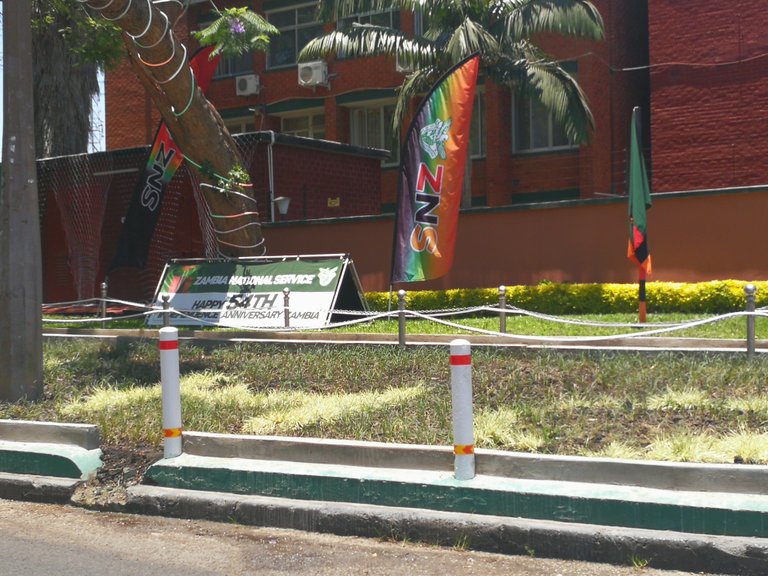I missed it by a few days.
The celebration of 54 years of Zambian independence
There were banners over the road leaving the airport, banners at government buildings, banners at places where the denizens clearly thought banners were the way to go. All celebrating independence from the colonialist British empire, which effectively collapsed in the early 1960s as most of their colonial "possessions" became independent during that heady time.

I snapped this photo as we were stopped at a "robot" (Southern African for "traffic light") on October 30th, and it reminded me that 54 is one of those ages you have to celebrate because you've achieved it, but you don't tend to invite the whole family or spend a bundle on the celebration. Frankly, that's how this celebration looked to this visitor who was only in Lusaka for a few days at the end of October. I wish I could tell you what the celebrations had been like on the day, but unfortunately I'd only arrived there on Sunday, 28 October. If wishes were horses....
From Independence Day - 24 October, 1964 to more or less today
Here are a couple of facts to help you catch up on Zambia's post independence story - by no means complete, just an introduction courtesy of Africa Geographic, one of my favourite magazines for many years:
During the early years of independence, Zambia was comparatively prosperous. Copper prices rose steadily from 1964 to 1970 boosted by the Vietnam War, and Zambia became the world’s third largest producer of copper. In the early 1970s Zambia’s economic fortunes took a turn for the worse. Copper continued to provide the great bulk of export earnings, but prices fluctuated erratically and suffered a prolonged fall in 1975. The price of oil shot up in 1973, and inflation, already serious, rapidly increased. The government, which committed to high spending, both publicly and privately, reacted by borrowing heavily abroad and drawing on reserves. The rising debt burden became a vicious circle that continued to injure Zambia’s dwindling economic fortunes.
The liberalisation of Zambia’s economy tied with the boom in copper prices has seen the increase in Zambia’s economic fortunes. Between 2001 and 2006, late President Mwanawasa aggressively pursued fiscal discipline and compliance to conditions given by Zambia’s creditors. This led to the cancellation of most of Zambia’s debt which stood at over $7 billion. Without the debt burden and increased revenues from the buoyant copper prices, the country was able to invest in infrastructure and service delivery. The ripple effects of this have resulted in Zambia being classified a lower middle income country, a significant achievement from the days it was classified as a highly indebted poor country.
Leaving beside the fact that independent Zambia is two years younger than me, and I have a (potentially mistaken) sense that I've gained some wisdom over my years, it appears to this observer that Zambia has indeed gained a wisdom of her own. What do I mean by that?
The pretty much un-fact-checked part of this post
The professional economists point to the real disaster of Zambia's re-ballooning (if that's a word, it fits the situation) national debt, which I won't go into here, other than to say it's huge and a big chunk of it is due to the national electricity utility borrowing billions for large scale projects from one particular country, China, which is making similar deals across the continent...but it's horrific and is particularly sad given that in 2005, the World Bank forgave some US$3.8 billion in debt relief, which wrote off more than 50% of Zambia's debt. Most of them throw their hands up in despair at the current level of indebtedness, but are pleasantly surprised by the GDP (Gross Domestic Product) growth figures, currently running at about 4%. That is huge!
Is that a good number?
It's surprisingly good for a country whose debt to GDP level is running over 50% (according to Trading Economics, the actual level is 55.6% (imagine if that was your home debt level - you'd only be paying back interest on your loans and wouldn't have any spare capital to do anything).
All I can tell you is that when you move in the urban areas, where most people live, there are a lot of people out shopping, buying consumer goods at modern shopping malls, eating in restaurants, chilling in bars, watching sports together over a cool Mosi.

Are Zambians doing it for themselves?
It sure looks that way. The latent entrepreneurial talent in Zambia is starting to show itself. Like the quiet kid in the back of the class that you don't realise is taking it all in, from my perspective Zambians are doing pretty well at what their political leadership is...well, let me not finish that sentence. Zambians continue to impress me with their tenacity and resilience.

Team South Africa banner designed by @bearone
Nice to learn the entrepreneurs are finding their feet, too many countries suffer after affects on relying on minerals out of the ground.
Interesting times lie ahead for Africa, as a people standing as one, growing together @kiligirl
Well said, @joanstewart!